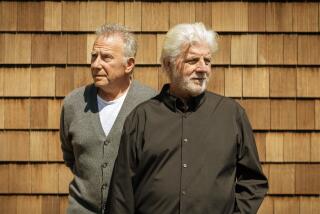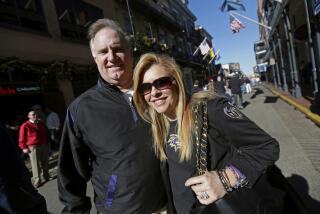Mikey’s World
- Share via
Like any kid who can’t keep track of his belongings, Michael Olson gets frustrated and yells out for help several times a day.
“Grandma, where are my legs?”
“I don’t know, honey. Where did you leave them last?”
The simple exchange about the 11-year-old’s prostheses hints at the matter-of-fact way he faces his extraordinary circumstances. The active fifth-grader has never experienced what it’s like to wash his hands with soap before dinner, that chore so common and reviled among children his age. Or scratch his head. He was born without hands.
He has never wiggled his toes in the sand, much less gone shopping for a pair of tennis shoes. He was born without legs.
Mikey has an extremely rare congenital birth defect that left him with short stumps as arms, and legs that end at his kneecaps. That doesn’t stop the Cypress boy from skateboarding, from being a gifted student or writing by sticking a pencil under his armpit or sewing by using his mouth. He loves to draw, and to dance with his cockapoo, Geri.
“He can’t wait until he’s 16 so he can drive a car,” says his grandmother, Sally Olson. She and her husband, Don, retirees, have been raising their grandson since 1995 and are his legal guardians.
“I don’t tell him he can’t,” she says. “We’re very frank with him. ‘Well, Mikey,’ we’ll say, ‘we have some things to overcome.’ ‘We’ll figure it out,’ he says. He’s not daunted, and I don’t want him to be daunted. He has not acknowledged the fact that he’s handicapped, and he never will.”
In public, Mikey gets around mostly with a wheelchair. But around home and in the schoolyard, he jumps off to walk and run by himself.
About every three months, Mikey is fitted for plastic “stubbies,” a prosthetic sleeve form-fitted to his thighs that he calls his legs. The stubbies, which resemble enormous plastic cups with black rubber soles on the bottom, help him walk and run.
In the coming months, Mikey is expected to undergo surgery at the Los Angeles Shriners Hospital to lengthen the bone in his left arm by as much as 2 inches and correct a bone deformity. Doctors say this should make life easier for him, regardless of whether he chooses to wear a prosthetic arm. Perhaps they can get the two arm stumps to touch in front, enabling Mikey to carry things.
Dr. Yoshio Setoguchi, medical director of the Child Amputee Prosthetics Project at Shriners, who has been Mikey’s doctor for the last several years, says Mikey’s limb deficiency does not have a name.
Setoguchi has been treating disabled children for about 35 years and says many of them have gone on to become successful lawyers, doctors, engineers and even prostheticians. He says he has high hopes for Mikey, a child who has always done exceptionally well in school and has been classified as gifted. But Setoguchi’s hopes are tinged with apprehension.
“He’s a remarkable kid,” Setoguchi says. “The issue is how much society is going to allow him to continue to do what he does.... There are some people in society that might close the door to him, and that would be a shame, because he has a lot to offer.”
With several deft moves, Mikey challenges those who say he can’t or shouldn’t by hopping on his skateboard and bounding down the driveway away from his home on a quiet cul-de-sac.
Sally Olson says she will never forget the day her grandson was born. The former nurse rushed over from jury duty to the hospital Dec. 20, 1989. The first person she saw was her husband standing grim-faced in the hallway. “There’s a problem,” he told her. “He doesn’t have arms and legs.”
Olson began to scream and cry for guidance from God. And before facing her son and his wife, she and her husband went into the hospital chapel and prayed. They had always been strong Christians, she says, and this was a traumatic period that tested their faith.
She told her grandson recently that when he was born, she was very angry with God. “As a matter of fact, I didn’t talk to him for a very long time,” she said to him. “But it’s not God’s fault that you are this way.”
Mikey’s father, Don Jr., a technician for Southern California Edison, also lives with the family. He and Mikey’s mother, Tammy, are divorced, but the couple remain on good terms.
Mikey does not like to think of himself as different, but sometimes reality gets in the way. As independent as he manages to be, he will probably always need an aide to help with personal chores.
And eating is often a problem. Although he tries to use a spoon or fork, it is difficult to master the task elegantly. His usual style entails taking bites of his food with his face hovering above the plate, a position he finds embarrassing in public. The worst thing about not having arms, he says, is not being able to grab objects, like his own glass of milk.
“It really bothers me asking for help from strangers,” he says. “I ask them and they say, ‘No, I don’t want to help you.”’ Even friends grow impatient at times with his inability to stuff books into a backpack.
In Kathy Cadigan’s fifth-grade class at Dickerson Elementary School in Cypress, the school year is winding down. Antsy students are working on a math practice test. In the last row, Mikey is sitting on top of his desk.
His small body is bent over completely, his forehead is propped on a soft blue pillow. His eyes are riveted downward. Mikey is diligently calculating the answers and writing them down using a pencil tucked through his right armpit. The writing is neat and small.
Using his knees, he quickly flips the paper over. This is also how he turns pages in a book. When he wants to be called on in class, he pushes up on his knees and waves his right arm until the teacher notices him. If she doesn’t, an aide assigned to Mikey will raise her own arm. She also helps get things out of his desk or backpack.
“At first, I think I underestimated him,” Cadigan says as she stands in the back of the classroom watching her students work. “He’s amazing, so it’s easy to be surprised.” For a Christmas project last year, the students were assigned to sew their own pillows. “I didn’t think he’d be able to do that,” she says. To her amazement, he was. “Using his mouth and his arm, he just managed to push [needle and thread] through.”
At recess, he is an enthusiastic soccer player, a small figure compared with his kicking classmates. His face as he rushes around with his awkward gait is flushed, a contrast to his usual pale skin sprinkled with freckles, under his cropped reddish hair. “I can run, but not very fast,” he says. “I can only go a tiny bit of a ways.”
Even as he figures out ways to overcome seemingly impossible physical hurdles, Mikey sometimes encounters bullying and insensitivity from a few of his peers--the boys, for example, who think it’s funny to block his way. “Some of them take advantage of me because I have no arms and legs,” he says plaintively. “If I could, I would grab them ....”
But Mikey also can count close pals among his classmates. One buddy since second grade, David English, 11, calls Mikey his “amazing little friend.” After school, David and other friends like to hang out at the Olson house. On a recent afternoon after school, David has to stay and help clean the classroom as punishment for an earlier infraction. He thinks Mikey is waiting for him outside.
Meanwhile, Don Olson is waiting to pick up his grandson in his van. The boy decides to go home and is accompanied by another close friend, Dustin Fox, 12.
Back at Mikey’s house, they are about to start playing a futuristic video game set in Mars called Red Faction, and Mikey is getting ready to snack on his favorite food, potato chips. David suddenly storms in.
“Why didn’t you wait for me?”
Mikey mumbles something and keeps his eyes fixed on the television screen.
“That’s ditching a friend,” David continues dramatically. “That’s not very nice.” More mumbling from the boy expertly maneuvering the video game controls using his knees, which are raw and bruised from all the service they are called on to do.
Minutes later, the three boys are laughing and chatting, the incident forgotten. With his friends, Mikey is clearly one of the guys.
One evening, while looking for something to do, Mikey remembers a pair of battery-operated prosthetic arms that have been sitting in a closet for a few years. He asks his grandfather to get them.
When he first got them, it took him about a month to find out that the custom-made arms did not work too well. The arms use nerve impulses to direct movement, but Mikey found that they often didn’t seem to know what he actually wanted them to do.
But they still look good. Without the batteries, the hands--with soft, fleshy and real-looking fingers--are stiff. Mikey tries them on and immediately begins to goof around.
One minute he’s trying to pick his nose. The next, he’s trying to whistle. The dog comes around and sniffs curiously. “Hey, I could do karate,” he says suddenly, trying out some pretend chops on the wary dog. His grandfather watches indulgently.
Mikey continues with his wish list. “I could do the pledge of allegiance, I could cluck like a chicken, do sign language ....”
“Should I take it off?” Don Olson asks, thinking the boy may be tiring of the game. Mikey sits down on the floor of his grandparents’ bedroom and looks in the closet mirror admiring his hand.
“Nah, you could leave it on for a little longer,” he says in his easygoing way. He continues to look at his image in the mirror.


